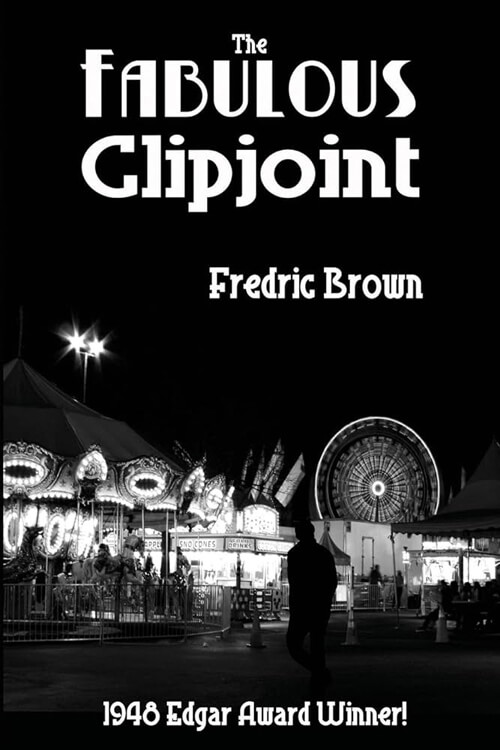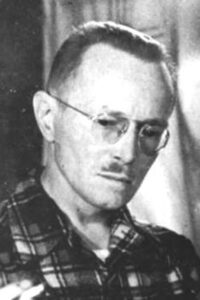
The Fabulous Clipjoint
In my dream, I was reaching right through the glass window of a hockshop. It was the hock shop on North Clark Street, the west side of the street, half a block north of Grand Avenue. I was reaching out a hand through the glass to touch a silver trombone. The other things in the window were blurred and hazy.
The singing made me turn around instead of touching the silver trombone. It was Gardie’s voice.
She was singing and skipping rope along the sidewalk. Like she used to before she started high school last year and got boy-crazy, with lipstick and powder all over her face. She was not quite fifteen, three and a half years younger than I. She had make-up on now, in this dream of mine, thick as ever, but she was skipping rope, too, and singing like a kid, “One, two, three, O’Leary; four, five, six, O’Leary; seven, eight…”
But I was waking up through the dream. It’s confusing when you’re like that, half one way and half the other. The sound of the elevated roaring by is almost part of the dream, and somebody is walking in the hallway outside the fiat. When the elevator has gone by, there’s the ticking of the alarm clock on the floor by the bed and the extra little click it gives when the alarm is ready to explode.
I shut it off and rolled back, but I kept my eyes open so I wouldn’t go back to sleep. The dream faded. I wish I had a trombone; that’s why I dreamed that. Why did Gardie have to come along and wake me up?
I thought I’d have to get up right away. Pop was out drinking last night and still wasn’t home when I slept. It’ll be hard to wake up this morning.
I wish I didn’t have to go to work. I wish I could take the train to Janesville to see my Uncle Ambrose at the carnival. I hadn’t seen him for ten years, since I was a kid of eight. But I thought about him because Pop had mentioned him yesterday. He’d told Mom that his brother Ambrose was with the J. C. Hobart carney that was playing Janesville this week, and that was the nearest they’d get to Chicago, and he wished he could take a day off and go to Janesville.
Mom (who isn’t my mom but my stepmother) had that looking-for-trouble look on her face and asked, “What do you want to see that no-good bastard for?” Pop, let it go. Mom didn’t like my Uncle Ambrose, so we hadn’t seen him for ten years.
Read or download Book
Fredric Brown
Fredric Brown (October 29, 1906 – March 11, 1972) was an American science fiction, fantasy, and mystery writer. He is known for using humor and his mastery of the “short short” form—stories of one to three pages, often with ingenious plotting devices and surprise endings. Humor and a postmodern outlook carried over into his novels as well. One of his stories, “Arena,” was adapted to a 1967 American television series Star Trek episode.
Life and works
Fredric Brown was born in Cincinnati. He spent a year at Hanover College, Indiana, before returning to Cincinnati. In 1929, he married and relocated to Milwaukee, where he worked various jobs before settling into a career as a proofreader.
According to his wife, Brown hated to write and did whatever he could to put it off: play his flute, challenge a friend to a game of chess, or tease Ming Tah, his Siamese cat. When Brown had trouble with a particular story, he would take a long bus trip to sit and think for days. When he would finally return home to sit in front of the typewriter, he produced work in various genres: mystery, science fiction, short fantasy, and black comedy.
Many of his books use the threat of the supernatural or occult before the “straight” explanation comes at the end. For example, “Night of the Jabberwock” is a humorous narrative of an extraordinary day in the life of a small-town newspaper editor.
Brown began to sell mystery short stories to American magazines in 1936. His first science fiction story, “Not Yet the End,” was published in the Winter 1941 issue of Captain Future magazine.
The 1944 short story “Arena” was used as the basis for the episode of the same name in the original Star Trek series. It was also adapted in 1973 for issue 4 of the Marvel Comics title Worlds Unknown.
Brown’s first mystery novel, 1947’s The Fabulous Clipjoint, began a series starring Ed and Ambrose Hunter. The story depicts how a young man gradually ripens into a detective under the tutelage of his uncle, an ex–private eye now working as a carnival concessionaire.
His science fiction novel What Mad Universe (1949) is a parody of pulp sci-fi story conventions.
The Lights in the Sky Are Stars (1952) tells the story of an aging astronaut trying to get his beloved space program back on track after Congress cuts its funding.
The short story “Answer” (1954) is thought to be the earliest representation of the “Yes, now there is a God” science fiction work that inspires a common myth or legend of a supercomputer that releases itself from human control. The story was initially published in Angels and Spaceships, and the entire collection was later re-published as Star Shine for paperback adaptation.
Martians, Go Home (1955) is both a broad farce and a satire on human frailties as seen through the eyes of a billion jeering, invulnerable Martians who arrive not to conquer the world but to drive it crazy.






